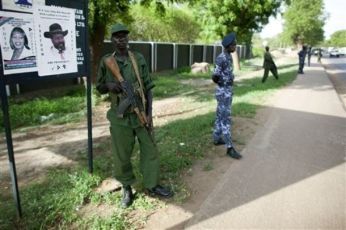JUBA: general reaction to the results of Sudan’s 2010 elections
April 26, 2010 (JUBA) – Residents in Juba, the capital of the semi-autonomous Southern Sudan, have expressed mixed reactions to the outcome of the recently conducted presidential, gubernatorial and parliamentary elections in Sudan.

In the results of the national presidential race, incumbent President Omer Hassan el-Bashir got 68.2% votes of the more than six million Sudanese who cast their vote during the five days of polling. He defeated other eleven presidential candidates, some of whom boycotted the elections before polling day.
In the South, the incumbent President of the region, Salva Kiir Mayardit, got 93% of the more than two million votes counted, defeating his only rival, Dr. Lam Akol Ajawin, who got only 7%.
In the gubernatorial elections in the ten states of Southern Sudan, nine were won by the SPLM candidates and only one was won by an independent candidate, Joseph Bakosoro of Western Equatoria state.
Commenting after the announcement was made, Rebecca Nyandeng de Mabior, wife of late Dr. John Garang de Mabior, and currently the Presidential Advisor on Gender and Human Rights in the Government of Southern Sudan, said she was expecting more than 93% from the presidential result. She however was quick to add that the winning percentage was also satisfactory.
Generally, people’s reactions to Salva Kiir’s overwhelming winning percentage were harmonious despite their different political parties’ backgrounds. About 95% of the people who gave their comments to Sudan Tribune said they voted for the SPLM candidate, Salva Kiir despite the fact that about 40% of them were from different Southern Sudan political parties.
When asked why they voted overwhelmingly for Kiir and not for his challenger, Dr. Lam Akol, the respondents gave a variety of reasons. These ranged from seeing SPLM as CPA partner and therefore the torch holder towards the referendum in 2011.
They also pointed to the SPLM’s perceived direct connection with the SPLA forces for the defense of the referendum in case of any eventuality, hence citing the importance of SPLM candidate winning the presidency and continuing to command the SPLA forces for smooth relations between the two and harmonious response to any situation of that kind.
The respondents also cited unity of the people of Southern Sudan as paramount, saying voting for Kiir and his running mate and Vice President designate, Dr. Riek Machar Teny, also means voting for the unity of the people of Southern Sudan and its collective leadership under the SPLM as the flag bearer party.
One respondent who said was member of a non-SPLM party but voted for Salva Kiir summed it up by saying “voting for SPLM Presidential candidate meant voting for CPA; it meant voting for self-determination; and it also meant voting for a capable defense of the referendum.”
A good percentage of them however indicated that if the elections were to be conducted after the referendum, some of their immediate priorities that guided their choices during the recent presidential elections would change.
They further explained that they may focus on particular personalities that are development-oriented in addition to some other necessary merits instead of the current generalized support behind a party.
STATES HIGH ELECTIONS COMMITTEE VS PEOPLE’S VOTES
When it came to the gubernatorial elections in the states, most of the respondents had a complete different view from how they perceived presidential elections at the level of the Government of Southern Sudan.
The general view was that unlike the presidential elections, personality of candidates and their developmental programs mattered to them irrespective of political parties such candidates had come from.
They touched with condemnation on the reported irregularities and vote rigging in the states. To them the ruling party, the SPLM, should have left the states elections free and fair so that gubernatorial and parliamentary elections would have reflected the true choices of the people even before the referendum.
Some of them cited the defeat of the former SPLM officials, turned independents, as a case in point. To them many independent gubernatorial candidates are popular and would have won governorship positions in many states if votes meant for them were not rigged.
Officials of States High Elections Committees, who were supposed to be neutral in the electoral process, were as well criticized for allegedly succumbing to intimidations by the ruling SPLM officials through their security operatives, or bowing down to material gains.
They alleged that the situation resulted to rigging or inflating of votes, in favor of incumbent SPLM candidates during entry of results into computer data system, before submitting the results to the National Elections Commission (NEC) headquarters in Khartoum.
(ST)
